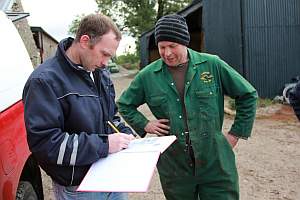Dozens of farmers in Cumbria have been able to reduce the amount of pollution that runs from their land into nearby rivers over the past year. Under an initiative called, “Water friendly farming,” a local conservation charity, Eden Rivers Trust, has worked with over 80 farms and spent around £300,000 on helping farmers to both improve their businesses and clean up the rivers.
The trial has been run on the beautiful River Eden and its tributaries in north Cumbria. The river system is recognised as being of international importance for its wildlife: it’s one of the last strongholds of the British white-clawed crayfish. Its lakes and reservoirs also provide a significant amount of drinking water for the public.
 If pollutants, like too much soil, manure or fertlisers from farms end up in rivers it can cause major problems for the wildlife and reduce the quality of drinking water. Significantly for farmers it also costs a lot of money if they have to buy more fertiliser to replace what’s been washed away.
If pollutants, like too much soil, manure or fertlisers from farms end up in rivers it can cause major problems for the wildlife and reduce the quality of drinking water. Significantly for farmers it also costs a lot of money if they have to buy more fertiliser to replace what’s been washed away. “So reducing the amount of pollution is good for farmers as well as for the environment,” says Will Cleasby of Eden Rivers Trust.
The scheme has involved a whole range of work and financial support to help farmers. Usually it starts with a plan which identifies sources of pollution and looks at farm yards, buildings, tracks and fields to see what needs to be done.
Often the work involves slowing the flow of water and pollutants into rivers which can also reduce the risk of flooding further downstream.
Examples of the work undertaken include:
- Putting roofs over farm yards and stores to stop manure being washed into rivers during heavy rain.
- Improving tracks, drainage and guttering to stop rainwater mixing with manure and soil.
- Collecting rainwater to save farmers money if they are on a water meter.
- Investigating the productivity of the soil to see how much fertiliser is actually needed. Often farmers can reduce the amount required, saving them money and reducing the risk to the environment.
- Making land more able to absorb water by using a large areator machine to cut slits in the grass. This also makes it more productive and reduces the potential for flooding on the farmland or elsewhere.
- Fencing eroded riverbanks to stop soil being trampled into rivers by farm animals.
- Planting hedges and trees which can slow the movement of rainwater and pollutants across the land and into water courses.
Farmers have contributed towards the costs but on most occasions the advice provided by Eden Rivers Trust has helped them to save money. The Penrith based Trust relies entirely on grants and has received money over the last year from Defra, SITA Trust, Cumbria Community Foundation, the Environment Agency, Natural England, the European Union and corporate sponsors including Tata Steel and Ullswater Steamers.








